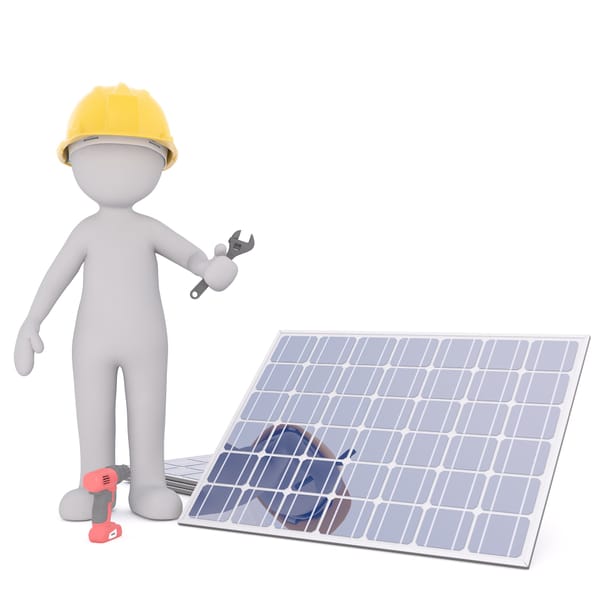Solar Power Scams: What They Are and How to Avoid Them

Solar energy is growing in popularity—it saves us money on our electricity bill, it’s light on the environment, and governments even promote programs to help make it more affordable.
But with the increased interest in solar panels, scammers are also taking advantage of people looking to go green. Solar panel scams target homeowners interested in installing solar energy systems. They involve scammers making false promises or tricking you into paying for services you’ll never receive.
Recently, the FTC also issued an alert to warn consumers about solar power scams, such as free solar panels or exaggerated savings.
“While there are some government-funded solar programs for households that qualify, “going solar” isn’t free,” the FTC warned. “Honest businesses will tell you exactly how much it’ll cost to get and install solar panels. If you've been approached by someone offering to install solar panels at no cost or promising you’ll never have to pay another electricity bill, be careful—it’s likely a scam.”
Common Telltale Signs of Solar Panel Scams
1. The ‘Free Solar Panels’ Claim
In this type of scam, fraudsters lure homeowners by offering "free" solar panels, claiming that government programs or grants will cover the entire cost of installation. While incentives such as federal tax credits exist, no government program will pay for the entire installation.
Reputable solar companies will be upfront about the costs and help you understand the financial benefits and options.
2. The ‘You’ll Never Pay Another Electric Bill’ Lie
Scammers exaggerate the financial benefits of going solar, claiming that you’ll never pay another electricity bill again. While solar panels can significantly reduce the energy costs for your household, they may not eliminate your electricity bill for good. Most likely, you’ll still need to stay connected to the grid for those times when the solar panels aren’t producing enough energy (cloudy days or at night), meaning that you will still have a small monthly utility charge.
- Aggressive Sales Tactics
Other warning signs of a solar power scam are high-pressure sales tactics. Scammers may insist that you sign a contract immediately without giving you time to review the details or do your research. Legitimate solar companies always give you time to review the agreement and answer any questions you may have.
4. Scammers Request Large Upfront Payments
Scammers in the solar business may ask you to make large upfront payments or deposits before starting work. Once you pay, they will stop any communication and disappear with your money. Be cautious of anyone who insists on full or substantial payments upfront.
5. Fake or Unlicensed Companies
Scammers often impersonate legitimate solar companies, use fake logos, or claim that they are government-affiliated. They usually bait homeowners with limited-time deals or phony government incentives.
How to Avoid Solar Panel Scams
Do Your Homework. Always research solar energy companies before signing any contract:
- Check licensed providers online via the BBB and websites such as SolarReviews
- Read customer reviews
- Get quotes from multiple companies to compare offers
- Closely inspect pricing, warranties and installation timelines
You can also refer to the Department of Energy’s guide for homeowners to better understand the process of going solar.
Avoid High-Pressure Sales. Don’t feel pressured to decide immediately. Take your time before choosing a solar company or signing a contract. Walk away from any offer if you’re asked to sign without fully understanding the agreement.
Never Pay Large Upfront Fees. Be cautious of any provider asking for large payments before starting work. Legitimate companies usually have a structured payment schedule.
Verify Licenses and Certifications. Ensure the company you’re working with has the appropriate certifications and licenses for solar installation in your area.
Verify Offers With Bitdefender Scamio
Use Scamio, our AI-powered scam detection tool to check for solar power scams. Before filling in any form or replying to an unsolicited email asking for personal information to apply for any solar power installation programs, send it to Scamio. You can send it any texts, messages, links, QR codes, or images, and it will analyze them to determine if they are part of a scam. Scamio is free and available on Facebook Messenger, WhatsApp, and your web browser. You can also help others stay safe by sharing Scamio with them in France, Germany, Spain, Italy, Romania, Australia, and the UK.
FAQs
- Can I get solar panels for free through a government program?
No. While incentives and tax credits for solar installations exist, no legitimate program offers free solar panels. Always be wary of companies claiming otherwise.
- Will solar panels eliminate my electricity bill?
No. Solar panels can significantly reduce your electricity costs, but you will still have some connection to the grid, especially for periods when your panels aren’t generating enough energy.
- How can I tell if a solar provider is legitimate?
Verify that the provider has the appropriate licenses, certifications, and insurance. You can also check reviews on trusted websites like the Better Business Bureau (BBB) or SolarReviews to see what other customers have experienced.
- What should I do if I think I’ve been scammed?
If you suspect you’ve fallen victim to a solar panel scam, report it to the Federal Trade Commission (FTC) and your state’s consumer protection agency. You should also file a complaint with the Better Business Bureau (BBB) and inform your family and friends.
tags
Author
Alina is a history buff passionate about cybersecurity and anything sci-fi, advocating Bitdefender technologies and solutions. She spends most of her time between her two feline friends and traveling.
View all postsRight now Top posts
Outpacing Cyberthreats: Bitdefender Together with Scuderia Ferrari HP in 2025
March 12, 2025
Streamjacking Scams On YouTube Leverage CS2 Pro Player Championships to Defraud Gamers
February 20, 2025
How to Identify and Protect Yourself from Gaming Laptop Scams
February 11, 2025
Your Device ‘Fingerprint’ Will Go to Advertisers Starting February 2025
December 24, 2024
FOLLOW US ON SOCIAL MEDIA
You might also like
Bookmarks







